
Do hybrids need a special 12V battery?
Hybrid vehicles require specialized 12V batteries designed to handle frequent charge-discharge cycles and support auxiliary systems. Unlike standard lead-acid batteries, hybrids use AGM (Absorbent Glass Mat) or EFB (Enhanced Flooded Battery) technologies for deeper cycling, vibration resistance, and compatibility with regenerative braking. These batteries typically operate at 13.6–14.4V and must integrate with the hybrid’s Battery Management System (BMS) to prevent voltage conflicts with the high-voltage traction pack.
Best Replacement 12V Battery Brands for Toyota Prius
Why do hybrids require specific 12V batteries?
Hybrids demand 12V batteries with higher cycle life, low self-discharge, and stable voltage to power electronics during engine-off phases. Standard batteries fail due to sulfation from partial charging, while AGM/EFB models handle 3–5x more cycles. Voltage spikes from regenerative braking (up to 15V) also require advanced voltage regulation.

Hybrids rely on their 12V battery even when the gasoline engine is off—for systems like infotainment, lighting, and ECU communications. AGM batteries use fiberglass mats to immobilize electrolytes, enabling spill-proof operation during sharp turns and reducing plate corrosion. EFB batteries, while cheaper, add extra acid circulation to improve cycling. Pro Tip: Always check the OEM’s battery group size (e.g., H6/48) to ensure terminal alignment and BMS compatibility. For example, a Toyota Prius uses a 35Ah AGM battery with 300+ cycles at 50% DoD, whereas a regular battery degrades after 150 cycles.
What happens if you use a regular 12V battery in a hybrid?
Standard flooded batteries experience sulfation and voltage sag under hybrids’ irregular charging patterns. Their thinner plates degrade faster, risking sudden failures during idle-stop events or BMS communication breakdowns.
Hybrids draw 12V power intermittently, especially during engine restarts and regenerative braking. Regular batteries lose capacity rapidly because their lead sulfate crystals harden when not fully recharged—a process called sulfation. AGM batteries, however, tolerate partial states of charge (PSOC) due to their compressed plate design. Voltage drops below 12.4V can also disrupt CAN bus networks, causing false error codes. Practically speaking, a 2018 Honda Accord Hybrid with a regular battery might fail to restart after 8–12 months, whereas AGM lasts 4–6 years. Pro Tip: Use a PSOC-compatible charger monthly to maintain sulfation resistance.
How do AGM batteries support hybrid systems?
AGM batteries provide spill-proof operation, vibration resistance, and rapid charge acceptance (up to 5x faster than flooded). Their low internal resistance (3–4 mΩ) ensures stable voltage during accessory loads like electric AC compressors.
The absorbed electrolyte in AGM batteries prevents acid stratification, a common issue in hybrids that park for extended periods. This design also reduces gassing, making them safer for enclosed compartments. During regenerative braking, AGM batteries accept charge currents up to 50A without overheating—critical for preserving the high-voltage traction battery’s health. For instance, Ford Fusion Hybrids use 70Ah AGM units to power the electric power steering during engine-off maneuvers. Pro Tip: Install AGM batteries with vent tubes if specified; hydrogen buildup can occur during high-rate charging.
| Feature | AGM | Flooded |
|---|---|---|
| Cycle Life (50% DoD) | 500–700 | 200–300 |
| Charge Acceptance at 50% SoC | 95% | 65% |
| Vibration Resistance | 3x Higher | Baseline |
How to Safely Dispose of and Recycle Car Batteries
How often should hybrid 12V batteries be replaced?
Hybrid 12V batteries last 3–5 years under normal use, but extreme temperatures or deep discharges (below 11.8V) shorten lifespan. Annual capacity testing via conductance testers (e.g., Midtronics) is recommended.
Unlike ICE vehicles, hybrids cycle their 12V batteries daily for systems like brake-by-wire and telematics. AGM batteries degrade when depth of discharge (DoD) exceeds 60% regularly. In Phoenix’s 110°F summers, battery life may drop to 2–3 years due to accelerated plate corrosion. Conversely, Alaskan hybrids might see 5–7 years. Pro Tip: Replace the battery preemptively if resting voltage drops below 12.2V—waiting risks BMS lockout. For example, Lexus ES Hybrids average 4-year replacements, costing $220–$400 including BMS reset.
What’s the cost difference between hybrid and regular 12V batteries?
Hybrid-specific AGM batteries cost $180–$400 vs. $80–$150 for flooded. Premium models like Odyssey Extreme AGM (65Ah) run $350 but offer 10-year warranties, offsetting long-term replacement costs.
While pricier upfront, AGM batteries reduce downtime and avoid ECU malfunctions from voltage instability. Let’s compare:
| Model | Type | Price |
|---|---|---|
| Optima YellowTop | AGM | $330 |
| DieHard Platinum | AGM | $280 |
| EverStart Maxx | Flooded | $110 |
Pro Tip: Buy from dealers offering free BMS resets—third-party installers may charge $75–$150 for reprogramming.
How does temperature affect hybrid 12V batteries?
AGM batteries lose 30–40% capacity at -20°C but outperform flooded in heat. Their sealed design prevents electrolyte evaporation, critical in engine compartments reaching 60°C during summer driving.
Cold weather increases internal resistance, reducing cranking amps for systems like the electric coolant pump. In contrast, heat accelerates grid corrosion—AGM’s calcium-alloy grids resist this better than flooded batteries’ antimony-based designs. For example, a Hyundai Ioniq Hybrid in Miami might experience 15% faster AGM degradation vs. one in Seattle. Pro Tip: Insulate the battery with thermal wraps in extreme climates to stabilize operating temperatures.
Battery Expert Insight
FAQs
Can I jump-start a hybrid with a regular 12V battery?
Yes, but only to activate the high-voltage system—connect jumper cables to the designated 12V terminals, not the traction battery.
Do hybrids charge the 12V battery while driving?
Yes, via a DC-DC converter that steps down the 200–300V traction pack to 14.4V, but irregular driving patterns may require external charging.
